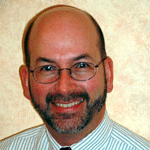Journals Director, ASPET
 First, tell us a bit about yourself (hometown, current locale, family, hobbies, community involvement?)
First, tell us a bit about yourself (hometown, current locale, family, hobbies, community involvement?)
I grew up in New Jersey near the shore (not the beach), worked in New York for almost 15 years after college, and then immigrated to the suburbs of northern Virginia because my partner of now 31 years got a new job here. Music has been a constant in my life. I’ve been singing in choirs and choruses since I was a kid and have had the great pleasure of singing in Carnegie Hall over a dozen times as part of a large chorus. From time to time I get involved helping out backstage in community theater. Otherwise, free time is spent working on our house and herding our three cats.
Describe some of your responsibilities, and how you or your organization fit into the scholarly communications web.
We publish four journals with a very small staff and a lot help from outside vendors. As Journals Director, any given day may include opportunities to deal with subscriptions, marketing, copyediting, production, peer review, license negotiations, maintaining our websites, permissions, and accounting. Publishing is our organization’s most visible and longest activity. ASPET was founded at the end of 1908 and published its first journal six months later. We were among the early online journals and have been early adopters of many online journal features including freely accessible content, the use of data supplements, a mobile version, and continuous publication. We have published online only since 2012.
What career path led to your current position?
When I got out of college, I was not sure what I wanted to do. I spent a few months body surfing and then working as a substitute teacher (everything from kindergarten phys. ed. to high school automotive shop). Publishing seemed to be a good fit for an English major, a rather naïve notion. I was determined to get a job entirely on my own and passed up the opportunity to tap into any connections. Big mistake. The result was six months of typing handwritten manuscripts for a law book publisher (in the days before desktop computers). I was promoted to copyeditor and copyediting supervisor, but getting a job with the IEEE really got me started in publishing. They had an excellent training program for copyediting and production. My manager was the most professional person with whom I have had the pleasure to work, and I learned from her example. As our department grew, I landed a newly created management position, and IEEE provided training for that as well. We moved from blue pencils and paper to working on screen, which expanded our responsibilities to keying author corrections, correctly formatting mathematical equations, and adjusting layouts. I learned and then helped teach my staff TeX. When I moved to Virginia, I was hired to head a journals department for a society that wanted to move its journals online. Unfortunately, its volunteer leadership decided they could do that themselves without professional staff getting involved. A coworker encouraged me to apply for my current job with the American Society for Pharmacology and Experimental Therapeutics. To be honest, I’m rather squeamish and couldn’t see working with medical journals. I think I waited almost a month before applying. ASPET was bringing its journals in house from a commercial publisher and putting them online at the same time. It was an opportunity to build a publishing department from scratch and be involved with every aspect of publishing. I’ve been with ASPET for 15 years.
Where do you see scholarly communications heading, and what new directions interest you most?
Scholarly communication will continue to grow as new areas of research develop. Technology has made it easier for researchers and others to conduct scholarly communication, but the scientists I know want to carry out research and not run publishing operations. There will always be a place for scholarly communications professionals. I’m interested in how traditional journal articles and journals will evolve and how succeeding generations of scientists will want information to be presented and intertwined with a variety of resources.
What are some of the surprises/obstacles that you’ve encountered during your career?
I expected to focus on editorial matters. Instead, I have had to learn about several technologies and keep up as they change, become knowledgeable about accounting and business, and pick up a good deal of information about running associations. I am very knowledgeable about postal regulations, which is information I no longer need. I expected change but did not anticipate the pace nor the need to continually learn new technologies and adapt to changing circumstances. Knowledge and skill sets have to be broad and deep. It’s an exciting challenge and keeps things interesting.
What advice would you give to people interested in a career in scholarly communications? What new roles or opportunities do you see emerging in the field?
Know that the work you do is going to evolve continuously. Whatever area of publishing you pursue, understand how your work fits into the entire workflow process and what effect you have on the process. Expand your area of knowledge whenever possible, whether through informal conversations with colleagues or formal learning opportunities. Draw on resources such as the Scholarly Kitchen, the SSP annual meeting and other educational opportunities, and network with your peers. There is always going to be a need for publishing professionals who can adapt and approach change with creativity and imagination.

